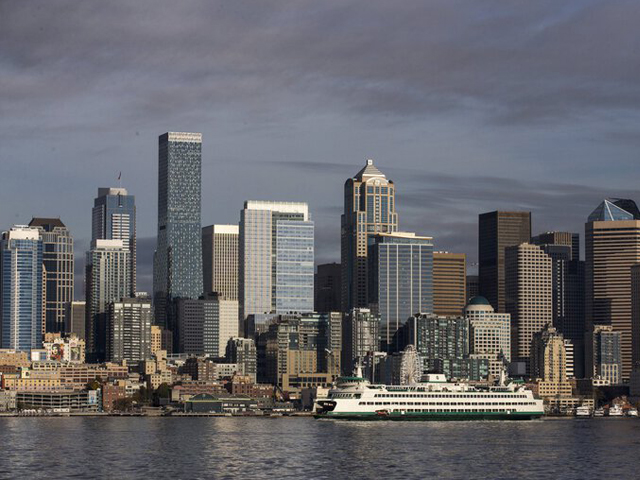News
Seattle Chamber sues over city’s new ‘JumpStart’ payroll tax on big businesses
Posted on

Image credit: The Seattle Times
This story was originally published by The Seattle Times on Dec 9, 2020.
Five months after the Seattle City Council pushed through a tax on high-earning workers at big companies, Seattle’s main business organization has fired back in court.
On Tuesday, the Seattle Metropolitan Chamber of Commerce asked King County Superior Court to declare the city’s new “JumpStart” tax “illegal, invalid, and unenforceable.” The tax, passed on July 6, takes effect next year and is expected to generate more than $200 million in 2021 to help cover revenue lost due to the coronavirus pandemic.
But the chamber and others in the Seattle business community argue that the tax violates the state constitution and threatens to undermine the city’s recovery from the pandemic.
“The Seattle City Council overstepped when they rushed this tax through,” chamber spokesperson Alicia Teel said in a statement Tuesday. “This illegal tax puts Seattle’s economic recovery at risk, now and years in the future.”
Supporters of the tax criticized both the lawsuit and the argument that the measure threatens the business community. “This tax was targeted specifically at mid- and large-size businesses that absolutely have the resources to be able to afford this,” said Shaun Van Eyk, a union representative at the Professional and Technical Employees Union Local 17, or PROTEC17.
Dan Nolte, spokesperson for the Seattle city attorney’s office, said the office was still reviewing the suit and couldn’t comment on it. But, Nolte added, “we certainly intend to defend the City’s ability to impose this tax.”
Spokespersons for the Seattle City Council did not respond to questions about the chamber’s lawsuit.
Labeled the “JumpStart” tax by Councilmember Teresa Mosqueda, who billed it as a way to help Seattle recover from COVID-19 and also to build a fairer economy, the measure won support from labor unions, community groups and some business owners.
Starting in 2022, the tax is intended to fund affordable housing, community-led development, local business assistance and Green New Deal investments.
Under the tax, businesses with at least $7 million in annual payroll will be taxed at rates of between 0.7% to 2.4% on salaries and wages paid to Seattle employees who make at least $150,000 per year.
The top 2.4% rate, which was meant to apply to a company like Amazon, will be levied on salaries of at least $400,000 at companies with at least $1 billion in annual payroll. Stock grants will be taxable, but not stock options, council staff have said.
Under the tax, a company with an $8 million payroll and a single employee making $180,000 would pay a tax of 0.7% on that one salary of $180,000 per year — or $1,260.
When the tax was enacted, the city estimated it could apply to perhaps 800 businesses; government entities and grocery stores will be exempt as long as the tax is in place, as will certain health care nonprofits for at least three years.
The JumpStart tax, which passed on a 7-2 council vote, marked the city’s second recent attempt to levy a tax on employees. In 2018, the city council enacted a “head tax” on employees, but quickly repealed the measure following a strong backlash by business groups.
JumpStart also faced some opposition. Mayor Jenny Durkan warned the tax could drive away some large companies and could be challenged in court. She allowed the measure to become law without her signature.
Business groups contended the tax would hamper the city’s economic recovery, and also would discourage employers from moving to Seattle or staying in the city after the pandemic.
They also argued that the measure is illegal because it seeks to impose “a tax on the right to earn a living,” which the chamber says has been ruled unconstitutional by the state Supreme Court.
The lawsuit cites a 1952 decision, Cary v. City of Bellingham, in which the state Supreme Court ruled that Bellingham could not levy a tax on the wages and other compensation received by city residents for services performed within the city.
But during deliberations over the JumpStart tax this summer, councilmembers argued the tax was on firm legal ground.
Kelsey Nyland, a spokesperson for Durkan, said in a statement Tuesday that the tax “will go into effect as the City defends the legal authority to impose a tax and the Court reviews the plaintiff’s request for a declaratory judgement.”
Whether the lawsuit would prevail in court is far from clear. But a loss for the city would be a significant blow to Seattle’s budget, said Jacob Vigdor, an economist at the University of Washington Evans School of Public Policy and Governance.
“Given how heavily the city is relying on this new tax revenue to plug holes in the budget and fund new initiatives, the effects of an injunction on the city would be immediate and significant,” he said.
The suit is likely to reignite a long-standing debate over the relationship between City Hall and the Seattle business community and the role that business can and should play in the city’s finances.
The tax is “going to be a roadblock to Seattle’s recovery and sends the wrong message to companies who want to grow here,” said Jon Scholes, president and CEO of the Downtown Seattle Association. “The city should immediately repeal this shortsighted tax before permanent economic damage is done.”
But Sarah Cherin, chief of staff at the United Food and Commercial Workers Local 21, which backed the JumpStart tax, said the lawsuit itself threatens the recovery.
She said revenues from the tax will help pay for relief for small businesses hurt in the pandemic, among other things. “If it gets invalidated by the courts, all of that is potentially a risk,” said Cherin.